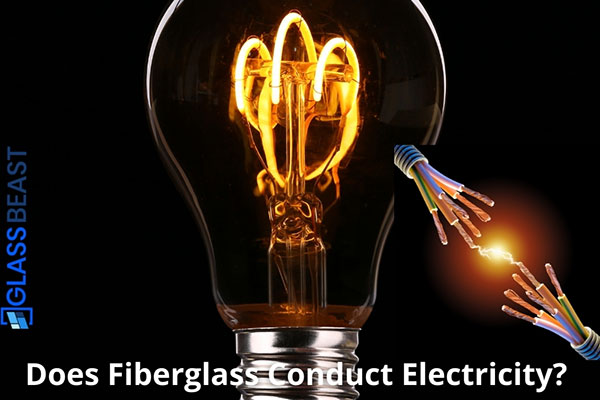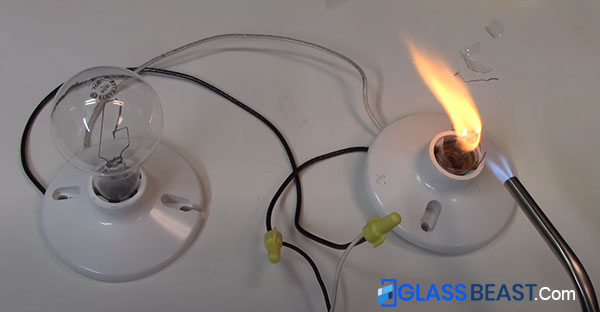Are you scared of conducting electric shock from a glass bulb? Fortunately, glass is an insulator. Touching glass electric appliances are safe normally.
You might have heard that perfect insulators never exist. So, you can’t say the glass is a perfect insulator. It does conduct electricity when it is heated. If you want to learn the scientific reasons why glass does not conduct electricity and why it conducts electricity when it is hot, this post is for you.
Does glass conduct electricity? At normal temperature, glass does not conduct electricity. But when it is heated it does conduct electricity. During heating, the weaker bonds of glass material break up allowing mobility of ions. These ions then conduct electricity and make glass look softer and more like fluid.
Glass material is physically rigid and compact. Its atoms are tightly held with no space for electrons to move freely to pass current. With increasing temperature, the positive ions inside it gain energy creating space for ions to move and carry current.

Can Glass Conduct Electricity
The answer to this question is not pretty much simpler. It’s true that glass does not conduct electricity normally. Will it conduct electricity when you heat it up?
Glass can conduct electricity when it is heated. But at normal room temperature, it is a non-conductor. When it is heated, the weaker chemical bonds break. As a result, glass becomes softer and turns into fluid. When more heat is supplied, the structure of the glass collapses. This means the positive ions( (Na+, K+, Ca++, Fe+++, etc.) have become mobile.
Continuous heat melts the glass and produces molten fluid-like material. The charges of this softened or molten glass have the ability to move freely and carry electric current from one place to another. When further heat is supplied, the ions move more rapidly. That’s why heated glass is the conductor of electricity.
Why Does Glass Not Conduct Electricity
From the above explanation, it is clear that glass does not conduct electricity at room temperature. Why does glass not conduct electricity? Under normal temperature, glass offers high resistance to the passage of electricity. It offers no space to let the electrons move freely to conduct electricity. Because electrons are tightly packed in the atoms. In other words, the volume of electrical resistivity of glass is much lower than metals.
But when it is heated, it can conduct electricity.
Comparison Chart of Conductivity of Metals & Glass
The volume resistivity of any material tells its ability to conduct electricity. The higher the value of volume resistivity, the higher will be the conductivity of that material. Let see the volume electric resistivity of some materials and compare it to the glass in the table below:
| Material | Volume Electric Resistivity |
| Copper | 1.72 x 10-8 Ωm. |
| Aluminum | 2.8 x 10-8Ωm. |
| Gold | 2.4 x 10-8Ωm. |
| Silver | 1.6 x 10-8Ωm |
| Iron | 1.9 x 10-7Ωm |
| Nickel | 7 x 10-8Ωm |
| Brass | ~0.6 – 0.9 x 10-7Ωm |
| Tin | 1.1 x 10-7Ωm |
| Zinc | 5.5 x 10-8Ωm |
| Platinium | 0.98 x 10-7Ωm |
| Silicon | 6.4 x 102Ωm |
| Quartz | 7 x 1017Ωm |
| Lead | 1.9 x 10-7Ωm |
| Glass | 2 × 10−14Ωm |
From this table, it is notable that the volume resistivity of glass material is much smaller than that of copper material. That’s why glass is not a good conductor of electricity.
Does Molten Glass Conduct Electricity
Curious to know whether molten glass conducts electricity or not? Yes, molten glass does conduct electricity when it is heated. Because heat turns the glass material into a fluid. The positively charged ions of weaker bonds become able to move freely in the molten or softened glass. These ions form the passage of electric current to pass through. However, it will not conduct electricity when the heat supply is disconnected.
That’s why when you touch lighted bulbs they are hot. As soon as the electric supply is there, they are the conductor. The weaker bonds of glass material are ready to leave the rigid glass texture when they are warmed. They break up to let the ions move freely. You can experience this phenomenon yourself by heating the glass with a MAPP gas torch. The energy produced as a result of heating glass can light a bulb. OMG.

Does Glass Conduct Static Electricity
Let us know about static electricity? When insulators are rubbed against each other, a charge is built up which is known as static electricity. It is not harmful as it develops as a result of stationary charges. But it can cause spark and crackling as it is produced mainly by friction.
Does glass conduct static electricity? Yes, glass conducts static charge which produces electric force. This electrical force has the ability to attract objects with no charge or little charge. That’s why we feel a charge or a little spark when we touch the TV screen.
Does Fiberglass Conduct Electricity
Fiberglass is not actually glass itself. It is a form of fiber-reinforced plastic using glass fiber. These fibers are woven randomly as a fabric. It is a cheaper and flexible material than carbon fiber. The plastic matrix used in fiberglass construction is mainly thermoset polymer matrix
Let’s read out: does fiberglass conduct electricity or not? Luckily fiberglass does not conduct electricity. Moreover, it is neutral to electromagnetic waves, radio waves and cellular signals. This makes it a highly usable product for the telecommunication industry.
You might have seen the protective covering of antennas and other telecommunication equipment made of fiberglass. Different types of fiber glasses are now extensively used in the construction industry.
Must Read: Everything About Glass Melting Point
How Well Does Glass Conduct Electricity
How well does glass conducts electricity? It depends on its temperature. Under 20C it is an insulator and non-conductor of electricity. When the temperature of glass increases it becomes a softer and better conductor. Though in a cold state it is an insulator.
When it is hot, a part of the glass material turns into liquid. The ions in this liquid material move freely and conduct heat and electricity. However, the conductivity of glass is lower than copper, iron and silver in heated form.
Is Glass a Bad Conductor of Electricity?
Yes, glass is a very bad conductor of electricity. The reason is that glass is made up of material that is highly resistant to electricity. Moreover, glass has no free electrons to provide the passage of electric current.
Is Glass an Electric Insulator?
Yes, glass is a good electric insulator and a poor conductor. It offers high resistance to electric current. However, we can’t say the glass is a perfect insulator. This is because even insulators like glass have some mobile charges when it is heated.
Why is Glass an Insulator of Electricity?
Glass is a good insulator because electrons are tightly held in it. This offers high resistivity to the flow of electrons. These electrons are tightly held within atoms and are unable to share heat and electricity to other atoms. That’s why glass is called an insulator.
Does Glass Marble Conduct Electricity
No, glass marbles don’t conduct electricity. They are small balls made up of glass. That’s why they are widely used in decorative electric appliances.
Why Glass is a non Conductor?
Glass is actually a non-conductor as it possesses all the properties of non-conducting material. It has no free electrons to allow the electric current to pass through. This is the main reason for the wider application of glass in electric appliances like the bulb, tube lights and other appliances.
Final Lines
It is evident that glass is a conductor or non-conductor both. It is the conductor in heated form and non-conductor when it is cold and at room temperature.
If you want to experience the conductivity of hot glass you can perform a simple experiment as mentioned in this post above. Heat up the broken bulb fitted in the circuit. The energy from this heated bulb will light up another bulb attached to the same circuit. But this energy will remain as soon as the glass is inflamed.
Thanks to the insulated nature of glass, its applications in electric appliances are wider.

